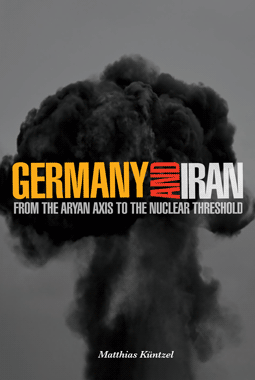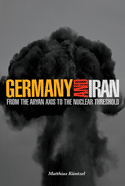By Matthias Küntzel · Friday, May 24, 2019 Matthias Küntzel’s Germany and Iran: From the Aryan Axis to the Nuclear Threshold, published by Telos Press Publishing, presents an extensive and detailed historical account of German–Iranian relations from the early twentieth century to the present. Save 20% on your purchase of Küntzel’s Germany and Iran in our online store by using the coupon code BOOKS20 during checkout. The following essay has been translated from the German by Matthew J. Cooper.
As late as May 7, 2019, France sent a message to Iran’s rulers: “We do not want Tehran to announce tomorrow actions that would violate the nuclear agreement, because in this case we Europeans would be obliged to reimpose sanctions as per the terms of the agreement.”
 The admonition was futile. On the following day, exactly one year since the United States withdrew from the nuclear agreement, Iran’s President Hassan Rouhani made two things public: He announced that effective immediately the regime no longer felt bound by the central provisions of the nuclear agreement. For example, by section 7, which requires the regime to limit its inventory of low-enriched uranium to 300 kg. Also affected is section 10, according to which Iran may not manufacture or store more than 130 tons of heavy water for fifteen years. Iran will not adhere to this provision either, according to Rouhani. Heavy water is used for reactors that are specially adapted for the production of weapons-grade plutonium. These quantitative restrictions on materials needed for nuclear weapons belong to the core of the agreement that Tehran is now avowedly violating. The admonition was futile. On the following day, exactly one year since the United States withdrew from the nuclear agreement, Iran’s President Hassan Rouhani made two things public: He announced that effective immediately the regime no longer felt bound by the central provisions of the nuclear agreement. For example, by section 7, which requires the regime to limit its inventory of low-enriched uranium to 300 kg. Also affected is section 10, according to which Iran may not manufacture or store more than 130 tons of heavy water for fifteen years. Iran will not adhere to this provision either, according to Rouhani. Heavy water is used for reactors that are specially adapted for the production of weapons-grade plutonium. These quantitative restrictions on materials needed for nuclear weapons belong to the core of the agreement that Tehran is now avowedly violating.
Continue reading →
By Telos Press · Wednesday, May 22, 2019 Writing at the American Interest, Matthias Küntzel analyzes the divide between the United States and Germany regarding Donald Trump’s decision last year to withdraw the U.S. from the nuclear deal with Iran. In his book Germany and Iran: From the Aryan Axis to the Nuclear Threshold, published by Telos Press Publishing, Küntzel presents an extensive and detailed historical account of German-Iranian relations from the early twentieth century to the present, which provides essential context for understanding this split. Save 20% on your purchase of Küntzel’s Germany and Iran in our online store by using the coupon code BOOKS20 during checkout.
An excerpt from Küntzel’s recent essay:
 Trump’s decision is not without risk. Given the nature of the Iranian regime, irrational responses and war scenarios can’t be ruled out. Exactly one year after the United States left the deal, Iranian President Hassan Rouhani announced a partial withdrawal, saying Iran would keep excess enriched uranium and heavy water instead of selling it. Continuing the policy of nuclear blackmail, he threatens to resume higher uranium enrichment after 60 days. However, at least for the time being, Tehran seems not to be interested in a massive escalation. Trump’s decision is not without risk. Given the nature of the Iranian regime, irrational responses and war scenarios can’t be ruled out. Exactly one year after the United States left the deal, Iranian President Hassan Rouhani announced a partial withdrawal, saying Iran would keep excess enriched uranium and heavy water instead of selling it. Continuing the policy of nuclear blackmail, he threatens to resume higher uranium enrichment after 60 days. However, at least for the time being, Tehran seems not to be interested in a massive escalation.
Trump’s alternative approach—to put sufficient economic and political pressure on the Iranian leadership to compel it to sign a new agreement that would address not only Iran’s nuclear ambitions but also its missile program and regional warmongering—may be a long shot, but it is worth trying. Effective sanctions, however, require the cooperation of Iran’s most important trade partners, Germany and the European Union. And that is where the problem starts.
Continue reading →
By Telos Press · Friday, August 31, 2018 In a new opinion piece in the Jerusalem Post, Sean Durns discusses Matthias Küntzel’s Germany and Iran: From the Aryan Axis to the Nuclear Threshold, published by Telos Press. Pick up your copy of Germany and Iran in our online store, and save 20% with the coupon code BOOKS20.
 As the German historian Matthias Küntzel detailed in his 2014 book, Germany and Iran: From the Aryan Axis to the Nuclear Threshold, close ties between the two countries go back to the pre-World War I era. As the German historian Matthias Küntzel detailed in his 2014 book, Germany and Iran: From the Aryan Axis to the Nuclear Threshold, close ties between the two countries go back to the pre-World War I era.
In the late 19th century, Persian hopes for industrial development hinged on German know-how and technological prowess. After the ascension of Kaiser Wilhelm II in 1888, “economic relations between the two countries began to expand swiftly” and “it became fashionable for young Persian intellectuals to be pro-German,” Küntzel notes.
Continue reading →
By Telos Press · Tuesday, October 25, 2016 Writing in the journal Contemporary European History, Mia Lee reviews a group of recent books that focus on the historical connections between Nazism, the Muslim Brotherhood, and the rise of al-Qaeda. Included in the review is Matthias Küntzel’s Jihad and Jew-Hatred: Islamism, Nazism and the Roots of 9/11, published by Telos Press. Purchase your copy in our online store, and save 20% by using the coupon code BOOKS20. An excerpt from the review:
Küntzel begins his narrative with the founding of the Muslim Brotherhood in 1928, which became the largest mass organisation in Egypt in the 1930s. During the war the Brotherhood was stridently anti-British, anti-foreigner and increasingly anti-Jewish. Its leader, Hassan al-Banna, had ties to al-Husaini. Once the war was over al-Banna was one of the most prominent Arab leaders to petition the Allied authorities for al-Husaini’s release from detention, and when the Mufti escaped from France in 1947 al-Banna personally welcomed him in Cairo. On the evidence of these ties, as well as his study of the Brotherhood’s ideology, Küntzel argues that the Brotherhood was the key point of transference of anti-Semitism from National Socialism to the Arab world. . . .
Continue reading →
By Telos Press · Tuesday, May 31, 2016 Writing at the Jerusalem Center for Public Affairs website, Joseph S. Spoerl reviews Matthias Küntzel’s Germany and Iran: From the Aryan Axis to the Nuclear Threshold, published by Telos Press Publishing. “Küntzel’s book,” writes Spoerl, “demonstrates a deeply disturbing truth, namely, that if Iran should acquire nuclear weapons and use them to commit a second Holocaust against the six million Jews of Israel, then Germany—the nation that committed the first Holocaust—will have played a central role in paving the way for the Iranian perpetrators.”
Save 20% on your purchase of Germany and Iran, as well as other Telos Press books, by using the coupon code BOOKS20 in our online store.
Continue reading →
By Telos Press · Tuesday, September 8, 2015 Writing at The Tower website, Ben Cohen examines Ali Khamenei’s eliminationist rhetoric toward Israel, as well as the responses of Western politicians in the wake of the Iran nuclear deal. Cohen’s article “Global Anti-Semitism Has a New Leader” draws on the historical research recently introduced by Matthias Küntzel in his book Germany and Iran: From the Aryan Axis to the Nuclear Threshold, now available in our online store.
Continue reading →
|
|
 The admonition was futile. On the following day, exactly one year since the United States withdrew from the nuclear agreement, Iran’s President Hassan Rouhani made two things public: He announced that effective immediately the regime no longer felt bound by the central provisions of the nuclear agreement. For example, by section 7, which requires the regime to limit its inventory of low-enriched uranium to 300 kg. Also affected is section 10, according to which Iran may not manufacture or store more than 130 tons of heavy water for fifteen years. Iran will not adhere to this provision either, according to Rouhani. Heavy water is used for reactors that are specially adapted for the production of weapons-grade plutonium. These quantitative restrictions on materials needed for nuclear weapons belong to the core of the agreement that Tehran is now avowedly violating.
The admonition was futile. On the following day, exactly one year since the United States withdrew from the nuclear agreement, Iran’s President Hassan Rouhani made two things public: He announced that effective immediately the regime no longer felt bound by the central provisions of the nuclear agreement. For example, by section 7, which requires the regime to limit its inventory of low-enriched uranium to 300 kg. Also affected is section 10, according to which Iran may not manufacture or store more than 130 tons of heavy water for fifteen years. Iran will not adhere to this provision either, according to Rouhani. Heavy water is used for reactors that are specially adapted for the production of weapons-grade plutonium. These quantitative restrictions on materials needed for nuclear weapons belong to the core of the agreement that Tehran is now avowedly violating. 


